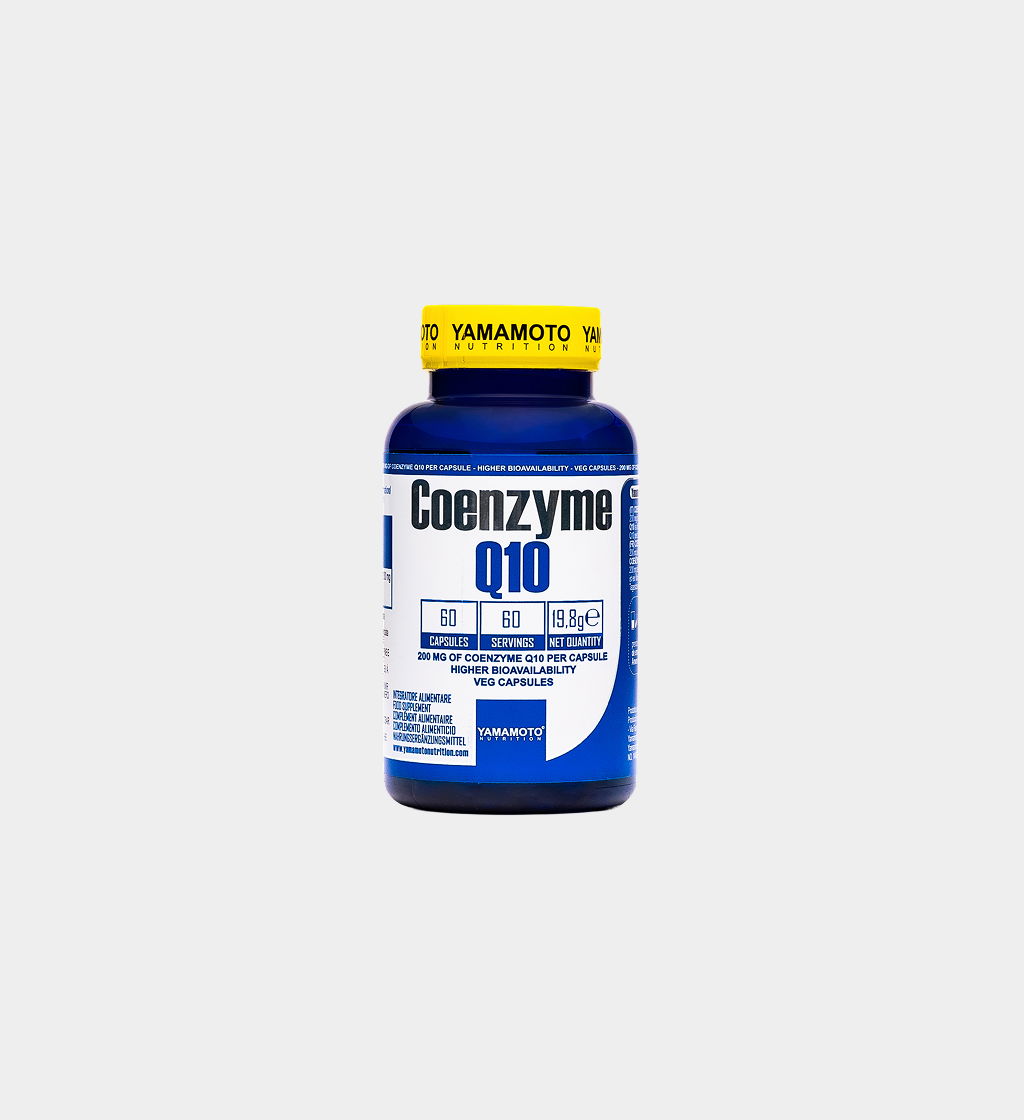Coenzyme Q10
60 Capsules
170 AED
Powerful anti-ageing antioxidant to protect cells against oxidative stress
- Powerful antioxidant, combats the action of free radicals
- Counteracts cellular ageing
- Supports energy production by mitochondria
- 200 mg Coenzyme Q10 per serving
- Maintains good physical efficiency and improves exercise tolerance
Coenzyme Q10 is Yamamoto Nutrition’s supplement of Coenzyme Q10, a powerful antioxidant molecule involved in energy production at the level of the mitochondria, the body’s “power plants”.
Coenzyme Q10, also known as ubiquinone (or ubiquinol), is a lipid-soluble molecule that plays an essential role in the proper functioning of cellular structures called mitochondria. Mitochondria are responsible for energy production within cells and coenzyme Q10 has an important antioxidant action, counteracting the formation of free radicals.
Mitochondria play a key role in the cellular respiration process, producing energy in the form of ATP (adenosine triphosphate). Coenzyme Q10 is essential for promoting ATP production in the presence of oxygen, thus contributing to physical efficiency. This molecule is abundant in active organs such as the heart, liver, kidneys and pancreas, which require increased energy production.
Numerous studies have shown that coenzyme Q10 also possesses remarkable antioxidant properties. It protects cell membranes from oxidative damage, counteracts the action of free radicals and combats cellular ageing. Due to these characteristics, coenzyme Q10 is considered a potential supplement for slowing down skin ageing.
The antioxidant action of coenzyme Q10 can strengthen the immune system, promote the proper functioning of the heart and protect it, as well as contributing to the maintenance of neurocerebral health, male fertility and combating the consequences of diabetes.
With advancing age, the concentration of coenzyme Q10 naturally decreases, causing a reduction in energy efficiency and antioxidant action. This promotes the ageing process and lower levels of this enzyme are also found in heart disease, diabetes and some neurodegenerative diseases. Lower levels of coenzyme Q10 are observed in sportspeople and athletes, especially those involved in endurance sports. Several studies suggest that coenzyme Q10 supplementation may improve exercise tolerance both in healthy adults and in people with cardiovascular and respiratory problems, contributing to general wellbeing.
Coenzyme Q10 is able to counteract oxidative stress, which is formed by free radicals, highly reactive molecules that can alter the function of other elements and cause long-term tissue damage. High levels of free radicals are associated with premature ageing of tissues. Therefore, the presence of coenzyme Q10 is extremely important in preventing the peroxidation of low-density lipoproteins, the main cause of hardening of arterial walls, which increases the risk of heart disease and hypertension.
The use of coenzyme Q10 is also recommended in sports, as athletes have high levels of free radicals in the body due to intense training. Coenzyme Q10 can help maintain optimal physical efficiency, improve exercise tolerance, support muscle recovery and promote lactic acid elimination. In addition, it may support cardiac function by increasing cardiac cell energy and reducing oxidative stress.
In summary, this supplement is an essential ally in combating fatigue, ageing and oxidative stress.
Scientific references
Coenzyme Q10. Monograph. Altern Med Rev. 2007 Jun;12(2):159-68. PMID: 17604461.
Zozina VI, Covantev S, Goroshko OA, Krasnykh LM, Kukes VG. Coenzyme Q10 in Cardiovascular and Metabolic Diseases: Current State of the Problem. Curr Cardiol Rev. 2018;14(3):164-174. doi: 10.2174/1573403X14666180416115428. PMID: 29663894; PMCID: PMC6131403.
Quinzii CM, DiMauro S, Hirano M. Human coenzyme Q10 deficiency. Neurochem Res. 2007 Apr-May;32(4-5):723-7. doi: 10.1007/s11064-006-9190-z. Epub 2006 Nov 10. PMID: 17094036; PMCID: PMC1832150..
Ho CC, Tseng CY, Chen HW, Chiu YW, Tsai MC, Chang PS, Lin PT. Coenzyme Q10 status, glucose parameters, and antioxidative capacity in college athletes. J Int Soc Sports Nutr. 2020 Jan 10;17(1):5. doi: 10.1186/s12970-020-0334-3. PMID: 31924223; PMCID: PMC6954618.
Jafari M, Mousavi SM, Asgharzadeh A, Yazdani N. Coenzyme Q10 in the treatment of heart failure: A systematic review of systematic reviews. Indian Heart J. 2018 Jul;70 Suppl 1(Suppl 1):S111-S117. doi: 10.1016/j.ihj.2018.01.031. Epub 2018 Jan 31. PMID: 30122240; PMCID: PMC6097169.
Suárez-Rivero JM, Pastor-Maldonado CJ, de la Mata M, Villanueva-Paz M, Povea-Cabello S, Álvarez-Córdoba M, Villalón-García I, Suárez-Carrillo A, Talaverón-Rey M, Munuera M, Sánchez-Alcázar JA. Atherosclerosis and Coenzyme Q10. Int J Mol Sci. 2019 Oct 20;20(20):5195. doi: 10.3390/ijms20205195. PMID: 31635164; PMCID: PMC6834161..
Zhang X, Shi Z, Liu Q, Quan H, Cheng X. Effects of coenzyme Q10 intervention on diabetic kidney disease: A systematic review and meta-analysis. Medicine (Baltimore). 2019 Jun;98(24):e15850. doi: 10.1097/MD.0000000000015850. PMID: 31192915; PMCID: PMC6587473..
Ben-Meir A, Burstein E, Borrego-Alvarez A, Chong J, Wong E, Yavorska T, Naranian T, Chi M, Wang Y, Bentov Y, Alexis J, Meriano J, Sung HK, Gasser DL, Moley KH, Hekimi S, Casper RF, Jurisicova A. Coenzyme Q10 restores oocyte mitochondrial function and fertility during reproductive aging. Aging Cell. 2015 Oct;14(5):887-95. doi: 10.1111/acel.12368. Epub 2015 Jun 26. PMID: 26111777; PMCID: PMC4568976.
| Nutritional Information | Per Daily Dose 1 capsule |
|---|---|
| Coenzyme Q10 | 200 mg |
| Total | 0.2 g |
Directions: Take 1 capsule daily with water.
Our advice: We recommend taking the daily capsule at the same time as one of your main meals: Coenzyme Q10 is absorbed and assimilated when taken with food.
Frequent doubts
- What is the difference between Ubichinone and Ubichinol? How come I find these terms associated with Coenzyme Q10? Coenzyme Q10 supplements can present either the oxidised (ubiquinone) or reduced (ubiquinol) form, as both forms appear to be equally potent in increasing circulating levels of total Coenzyme Q10 in the body. The term “Total Coenzyme Q10” refers to the sum of both forms, as Coenzyme Q10 can easily switch from one form to the other as it acts in the body. The names Ubichinone and Ubichinol have been assigned to Coenzyme Q10 because it is a ubiquitous enzyme, i.e. present in all cells.
- Are there any side effects associated with taking Coenzyme Q10? Coenzyme Q10 is well tolerated and does not generally produce any side effects, but beware that it may reduce the efficacy of certain chemotherapeutic and antihypertensive drugs and warfarin.
Warnings: Do not exceed the recommended daily dose. Keep out of reach of children under 3 years. Food supplements should not be considered as a substitute for a varied, balanced diet and a healthy lifestyle.
Storage Instructions: Store in a cool, dry place. The expiry date refers to the product properly stored, in its intact packaging.
Why choose Coenzyme Q10:
- Powerful antioxidant, combats the action of free radicals
- Counteracts cellular ageing
- Supports energy production by mitochondria
- 200 mg of Coenzyme Q10 per serving
- Maintains good physical efficiency and improves exercise tolerance
- Vegetable capsules, free of gelatine of animal origin
- Raw materials of the highest quality and safety
You must be logged in to post a review.



Reviews
There are no reviews yet.